To accompany your Come Follow Me study for August 26 to September 1
In addition to reading Helaman 1-6, you will enjoy the related commentary in the Institute of Religion Book of Mormon Student Manual at:
You may also enjoy watching the following videos in connection with this week’s reading:
If you would like a Kahoot game related to this material which you could use for personal study or use with your family or your class, click here: https://create.kahoot.it/share/helaman-1-6/16e5f3fa-a2fb-42fe-9245-8fdb5dc1f287 . To use it with a group, after clicking on this link, you will need to log into Kahoot, creating a free account if you have not done so previously, then click on the blue “Start” button. Some of the Kahoot questions may presuppose that the player has read through the suggested answers to the following Points to Ponder and at least has browsed the Institute student manual as well.
Points to Ponder in Helaman 1-6
1. As the book of Alma ends, we find the Nephites in a state of peace and righteousness to the point that “they did humble themselves exceedingly” and “did pray unto the Lord their God continually, insomuch that the Lord did bless them, according to his word, so that they did wax strong and prosper in the land.” (62:45-51.) The book of Helaman is a different story. List and document (chapter and verses) up to 8 societal changes from good to bad or bad to good can you find in today’s reading. (The following are in chronological order.)
- Nephites become wicked ___________________________________________
- Nephites repent _________________________________________________
- Nephite turn wicked again ___________________________________________
- Nephites at least partially repent _____________________________________
- Nephites return to wickedness _______________________________________
- Lamanites turn to righteousness ______________________________________
- Nephites repent again ______________________________________________
- Nephites once more turn wicked______________________________________
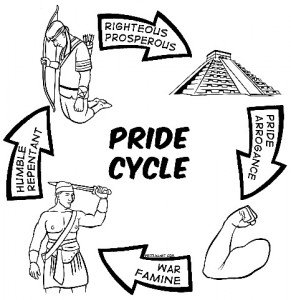
2. List at least one passage from today’s reading to illustrate the following statement from David O. McKay: “There is another danger even more menacing than the threat of invasion of a foreign foe. It is the unpatriotic activities and underhanded scheming of disloyal groups and organizations within our own borders.”
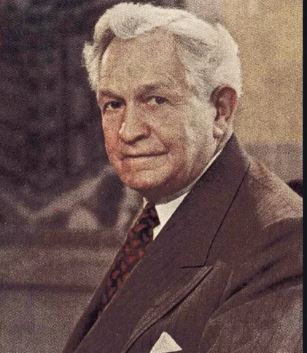
Questions on Helaman 1
3. How did Coriantumr resemble a beginning chess player?

4. What interesting thing did Tubaloth and Coriantumr have in common?
5. Why did the Nephites pardon the Lamanite soldiers but execute their own people who followed Paanchi or Kishkumen, even those who hadn’t personally killed anyone?
Questions on Helaman 2
6. Why do we hear so much about the Gadianton robbers in the Book of Mormon instead of the “Kishkumen Killers”? Why was the group renamed?

7. How serious a problem did Gadianton’s band eventually become?
8. Who is the “I” in Helaman 2:14?
Questions on Helaman 3
9. What is the relationship between pride and dissensions and contention? (3:1-2.)
10. The addition of what one letter in 3:3 would probably make the verse make more sense?
11. Did the Nephites really extend from the Arctic Ocean down to the Antarctic Ocean? What does 3:8 mean?
12. What benefit did Helaman hope to achieve by naming his sons “Nephi” and “Lehi”?
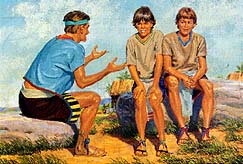
13. What is the nature of the “prosperity in the church” in 3:24-25? How did the members get so rich?
14. Why were even the high priests and teachers “astonished beyond measure” by the blessings that were poured out upon the people? Isn’t that what they should have expected when the people lived righteously? (3:25.)
15. What does 3:29 mean when it says the word of God is “quick”? How can a word be speedy?
16. What do you suppose 3:33 means by “the people who professed to belong to the church of God”? Were some pretending to have been baptized who really hadn’t been? Or were some baptized members in a more fundamental sense not really part of the church?
17. Can you diagram the process described in 3:35?
Questions on Helaman 4
18. What is so depressingly typical about the origin of the great war in chapter 4?
19. What was the most important thing Moronihah did in his efforts to regain captured Nephite land?
20. Why did the Nephites regain only half of their land, even though they had repented?
Questions on Helaman 5
21. What eight letter word appears 15 times in the first 14 verses of this chapter? Why would President Spencer W. Kimball have suggested it may be the most important word in the English language?
22. Which passage suggests that our missionaries may do more to reduce the sale of illegal drugs than having more police officers or more prisons?
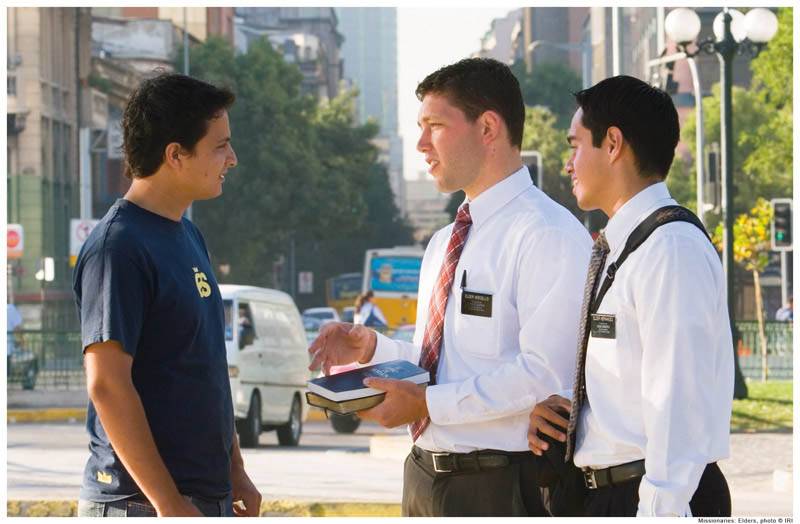
23. In plain English, what does it mean to build upon the foundation of Christ? (5:12)
24. In what sense was Nephi’s and Lehi’s success in 5:17 a first in Book of Mormon history?
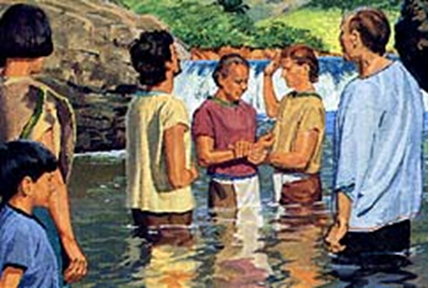
25. How do you compare and contrast the mission of Lehi and Nephi with that of the sons of Mosiah some years earlier? How do you account for the differences? Do you expect more or less divine power to be shown forth among Latter-day Saint missionaries in years to come? Why?
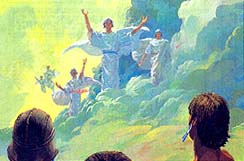
26. How can such a quiet voice as is mentioned in 5:30 be so piercing?
27. Why couldn’t the words mentioned in 5:33 be uttered by man? Can’t men utter any words that exist?
28. What to you was the most remarkable aspect of Lehi’s and Nephi’s mission? How does their experience relate to Alma 31:5?
Questions on Helaman 6
29. If you skipped Helaman 5 & 6, why would the succeeding chapters be so confusing to you?
30. Why do people tend to get so rich when they become righteous? (6:9) (Give at least two reasons.)
31. Does 6:17 suggest that the U.S. may need another major war soon?
32. Can Satan really reveal information to his followers, or can he simply put evil feelings into their hearts? (6:26)
33. How did the Nephite approach to the Gadiantons differ from that of the Lamanites? How practical would that be today?
34. Why would anyone vote for the Gadianton robbers, as the Nephites seem to have done? (6:38-39)
Possible Answers to Points to Ponder in Helaman 1-6
1. As the book of Alma ends, we find the Nephites in a state of peace and righteousness to the point that “they did humble themselves exceedingly” and “did pray unto the Lord their God continually, insomuch that the Lord did bless them, according to his word, so that they did wax strong and prosper in the land.” (62:45-51.) The book of Helaman is a different story. List and document (chapter and verses) up to 8 societal changes from good to bad or bad to good can you find in today’s reading. (The following are in chronological order.)
- 1:18; 3:17—Nephites become wicked
- 3:23-32–Nephites repent
- 3:36; 4:11-13–Nephites turn wicked again
- 4:15–Nephites at least partially repent
- 4:22–Nephites return to wickedness
- 6:1–Lamanites turn to righteousness
- 6:5-6–Nephites repent again
- 6:17–Nephites once more turn wicked
2. List at least one passage from today’s reading to illustrate the following statement from David O. McKay: “There is another danger even more menacing than the threat of invasion of a foreign foe. It is the unpatriotic activities and underhanded scheming of disloyal groups and organizations within our own borders.” (Conference Report, October 1939, pp. 102-105.)
1:7; 1:15; 1:16; 1:18; 2:13; 4:11; 6:3; 8:1
Questions on Helaman 1
3. How did Coriantumr resemble an amateur chess player?
He plunged into the middle of Nephite lands without sufficient support troops, like a new chess player who rushes down to his opponent’s side of the board with his queen, only to lose it.
4. What interesting thing did Tubaloth and Coriantumr have in common?
Both were former Nephites.
5. Why did the Nephites pardon the Lamanite soldiers but execute their own people who followed Paanchi or Kishkumen?
Lamanite soldiers were just doing their duty to their country. Supporters of Paanchi and Kishkumen were willing traitors to the Nephite cause.
Questions on Helaman 2
6. Why do we hear so much about the Gadianton robbers in the Book of Mormon instead of the “Kishkumen Killers”? Why was the group renamed?
Though Kishkumen was the founder of the band, he was killed early in its history, and Gadianton took over the leadership.
7. How serious did Gadianton’s band eventually become?
See 2:13.
8. Who is the “I” in Helaman 2:14?
Mormon, who as the abridger of the record is inserting an editorial comment.
Questions on Helaman 3
9. What is the relationship between pride and dissensions and contention?
See 3:1-2. Pride is the cause of contentions and dissensions.
10. What addition of one letter in 3:3 would probably make more sense?
Put an “r” on “yea” and make it read “year,” taking out the preceding comma.” Quite possibly Oliver Cowdery, who was acting as scribe during the translation, got sloppy with his “r.” Or maybe John Gilbert, the typesetter, failed to include it.
11. Did the Nephites really extend from the Arctic Ocean down to the Antarctic Ocean? What does 3:8 mean?
Presumably, this refers to the entire extent of Nephite territory, which was quite small–perhaps the whole of Mesoamerica. A look at a map of southern Mexico shows seas on all four sides, as 3:8 indicates.
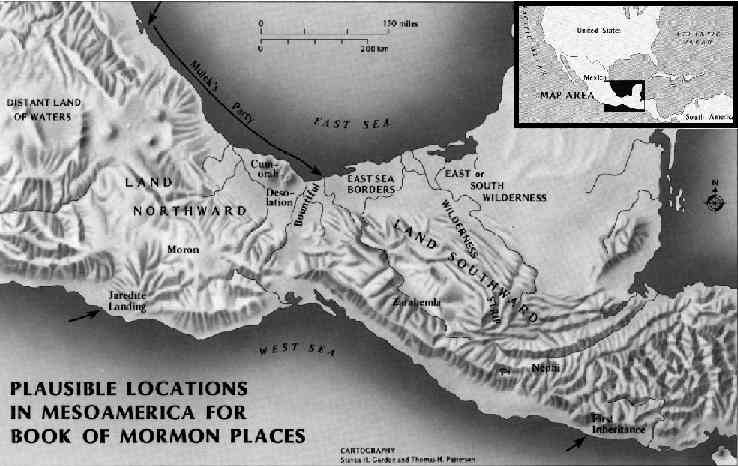
12. What benefit did Helaman hope to achieve by naming his sons “Nephi” and “Lehi”?
As 5:6 indicates, he hoped to inspire them to emulate their illustrious namesakes.
13. What is the nature of the “prosperity” spoken of in the church in 3:24-25? How did the members get so rich?
This refers to spiritual prosperity, not the financial kind–large numbers of converts and an ample outpouring of the gifts of the Spirit.
14. Why were even the high priests and teachers “astonished beyond measure” by the blessings that were poured out upon the people? Isn’t that what they should have expected when the people lived righteously? (3:25)
Evidently the blessings from heaven were even more than they had expected. God is extra generous with the faithful.
15. What does 3:29 mean when it says the word of God is “quick”? How can a word be speedy?
“Quick” in this sense means “alive,” “lively,” or “vivid,” not “speedy.” Paul uses the word in the same sense in 2 Timothy 4:1, when he says that Jesus Christ “shall judge the quick and the dead” when He comes.
16. What do you suppose 3:33 means by “the people who professed to belong to the church of God”? Were some pretending to have been baptized who really hadn’t been? Or were some baptized members in a more fundamental sense not really part of the church?
Probably these were baptized members who, while members of the external organization, are not yet members in the spiritual sense spoken of in D&C 10:55, 67 and 76:54.
17. Can you diagram the process described in 3:35?

Questions on Helaman 4
18. What is so depressingly typical about the origin of the great war in chapter 4?
It once again originates in dissensions in the church and in the “wickedness and abominations” among the Nephites.
19. What was the most important thing Moronihah did in his efforts to regain captured Nephite land?
Preached to the people (4:14) so they could qualify for the Lord’s assistance.
20. Why did the Nephites regain only half of their land, even though they had repented?
As 4:22-24 makes clear, their repentance was woefully incomplete.
Questions on Helaman 5
21. What eight letter word appears 15 times in the first 14 verses of this chapter? Why would President Spencer W. Kimball have suggested it may be the most important word in the English language?
The word is “remember.” Almost always, in the scriptures, when people are “remembering,” they are grateful for all God has done for them and are trying to keep His commandments and thus qualify for His continued blessings. When they “forget,” they are almost always in big trouble. President Kimball said: “When you look in the dictionary for the most important word, do you know what it is? It could be remember. Because all of you have made covenants — you know what to do and you know how to do it — our greatest need is to remember. That is why everyone goes to sacrament meeting every Sabbath day — to take the sacrament and listen to the priests pray that ‘they may always remember him and keep his commandments which he has given them.’ Remember is the word. Remember is the program.”
Kimball, Spencer W. “Circles of Exaltation,” Address to Seminary and Institute Personnel, BYU, June 28, 1968.
22. Which passage suggests that our missionaries may do more to reduce the sale of illegal drugs than having more police officers or more prisons?
5:2-4
23. In plain English, what does it mean to build upon the foundation of Christ? (5:12)
It would include patterning one’s life after Christ’s, living by his teachings, and receiving personal guidance and direction from Him through the Spirit.
24. In what sense was Nephi’s and Lehi’s success in 5:17 a first in Book of Mormon history?
Never before had any significant number of apostates been brought back into the fold.
25. How do you compare and contrast the mission of Lehi and Nephi with that of the sons of Mosiah some years earlier? How do you account for the differences? Do you expect more or less divine power to be shown forth among Latter-day Saint missionaries in years to come?
Both preached to the Lamanites and both experienced remarkable conversions. Lehi and Nephi served for a shorter time than the sons of Mosiah, but their results were even more spectacular. Whereas the sons of Mosiah converted a significant minority of Lamanites who then had to flee northward for their lives, Lehi and Nephi converted virtually the entire nation, which then voluntarily gave back the conquered Nephite lands. There was a more spectacular display of divine power shown forth in the ministry of Lehi and Nephi.
It appears that as wickedness increases and the power of evil intensifies, so does the outpouring of the power of God intensify proportionately. In accord with this principle, we might expect yet greater divine power to be shown forth in modern-day missionary work than that which has typically accompanied our missionaries to date. President Russell M. Nelson in an October 2022 general conference address so promised, as follows: “My dear brothers and sisters, so many wonderful things are ahead. In coming days, we will see the greatest manifestations of the Savior’s power that the world has ever seen. Between now and the time He returns “with power and great glory,” He will bestow countless privileges, blessings, and miracles upon the faithful.”
26. How can such a quiet voice as is mentioned in 5:30 be so piercing?
It is quiet to the ears but penetrating to the spirit.
27. (5:33) Why couldn’t these words be uttered by man? Can’t men utter any words that exist?
Because they were spiritually communicated, and mere spoken words cannot convey the same power unless accompanied by the same spirit.
28. What to you was the most remarkable aspect of Lehi’s and Nephi’s mission? How does their experience relate to Alma 31:5?
Perhaps it was the fact their preaching accomplished what all of the Nephite army could not in securing the return of Nephite lands, in demonstration of the principle of Alma 31:5 that the preaching of the word is more powerful than the sword.
Questions on Helaman 6
29. If you skipped Helaman 5 & 6, why would the succeeding chapters be so confusing to you?
Because the Lamanites are now the “good guys” and the Nephites the “bad guys,” quite unlike anything previously seen in the Book of Mormon.
30. Why do people tend to get so rich when they become righteous?
- They don’t waste their money on frivolous and wicked pursuits,
- They cooperate together
- They enjoy the direct blessings of the Lord.
31. Does 6:17 suggest that the U.S. may need another major war soon?
It might not hurt! But the COVID-19 pandemic may have accomplished some of what a war would have done.
32. Can Satan really reveal information to his followers, or can he simply put evil feelings into their hearts? (6:26)
Evidently he can reveal specific information! This might cause us to recognize that Ouija boards, for example, can be more than a harmless game but could actually serve as a conduit for Satanic messages.
33. How did the Nephite approach to the Gadiantons differ from that of the Lamanites?
The Nephites supported and embraced the Gadianton philosophy, whereas the Lamanites eradicated the group from among them.
34. Why would anyone vote for the Gadianton robbers as the Nephites seem to have done?
Presumably because they thought they could get rich at the expense of others. This is not unlike some people’s attitude toward government today, which they view as a tool to take from others for their own benefit.
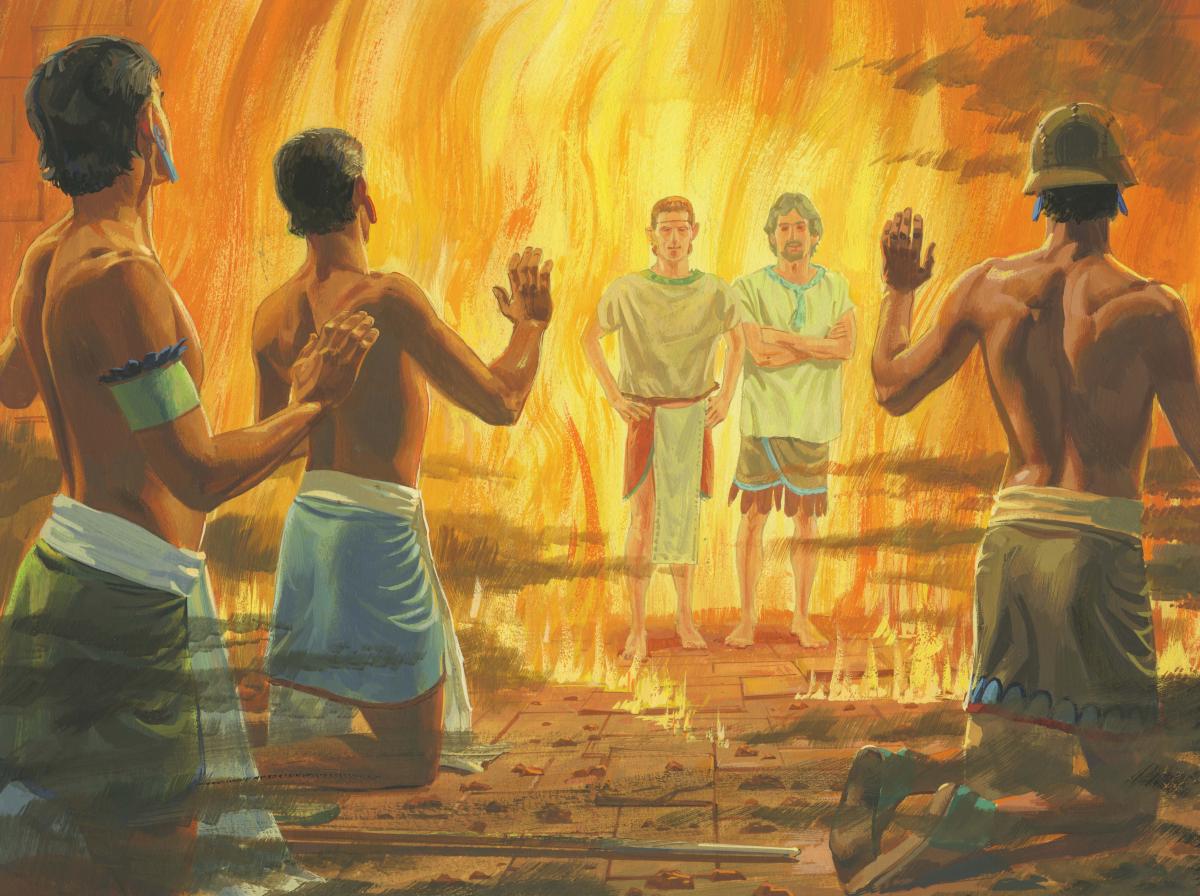
Wow! I’m glad I stumbled across this! Thank you so much for sharing the truth of the Lord to bless me and others.❤️